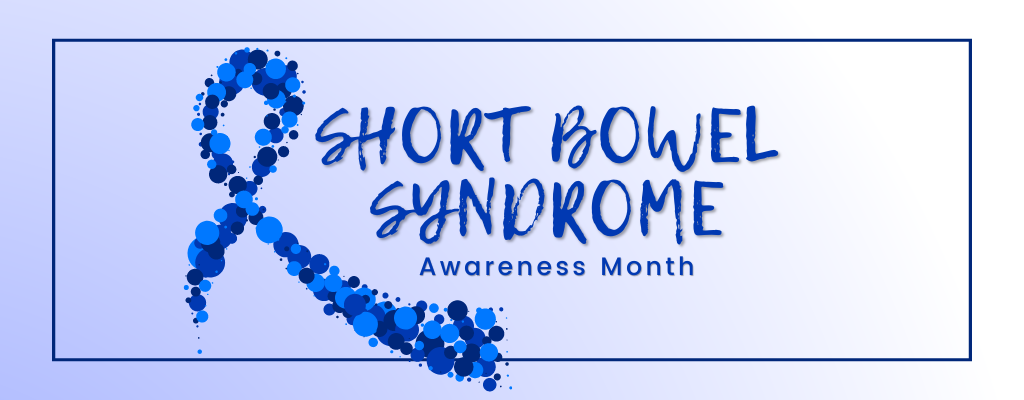IBD | Information | Ostomy

Individuals who have Inflammatory Bowel Disease (IBD) (in particular Crohn’s disease) and have had small bowel resections that result in the need for parenteral nutrition (where one obtains some or all their calories or nutrients intravenously) or regular intravenous hydration may have Short Bowel Syndrome (SBS). The overlap between SBS symptoms and IBD symptoms can make it difficult for people who have IBD with a history of surgical resections of their small bowel to determine if symptoms are from their IBD or SBS. Furthermore, there can be confusion about what exactly SBS is and what to do about it! To help demystify SBS this blog breaks it all down!
Generally speaking, Short Bowel Syndrome (SBS) occurs when someone’s small intestine (also referred to as the small bowel) is shortened or damaged and does not absorb enough nutrients or fluids from foods to maintain health [1].
Just under half of those with SBS may not have enough working intestine to absorb necessary water, nutrients, and electrolytes to sustain life and will require parenteral support (IV nutrition and/or IV hydration). This may be referred to as Short Bowel Syndrome with Intestinal Failure (SBS-IF).
According to the Mayo Clinic someone with Short Bowel Syndrome may have the following symptoms:
Individuals with SBS are unique– not everyone has all the symptoms or the same symptoms as each other.
The treatment options for SBS and SBS-IF range from nutrition support to surgeries.
Intestinal rehabilitation is a multidisciplinary, coordinated approach to treating SBS and IF that aims to restore as much bowel function and absorption as possible. Individuals who may be a part of one’s intestinal rehabilitation team include nutrition support professional, gastroenterologists with specialized knowledge in SBS, colorectal surgeons, and mental health support. Ideally, individuals with SBS would have access to intestinal rehabilitation. However, individuals who need it have found that it can be hard to access due to geographic, socioeconomic, and other barriers [3].
Obtaining intestinal rehabilitation often requires a referral to an intestinal care center as well as prior approval from one’s insurance. With that said, individuals with SBS and/or IF can inquire about intestinal rehabilitation with their doctors and/or initiate phone calls to intestinal rehabilitation or intestine care centers. A good starting point is to talk with one’s existing team and/or conduct an internet search for “intestinal rehabilitation” and your state to locate a center to call directly to inquire.
Due to the lack of bowel length and malabsorption individuals with SBS may require nutrition or hydration support. The main types of support are; parental nutrition, intravenous hydration, enteral nutrition, and specific diets meant to increase absorption.
Parenteral nutrition is a way to receive nutrients by bypassing your digestive system. People who can’t absorb nutrients for various reasons, such as SBS, can temporarily or permanently receive nutrition intravenously through an IV catheter. Parenteral nutrition can be supplementary, known as partial parenteral nutrition (PPN), or complete, known as total parenteral nutrition (TPN) [5].
Nutrition support, such as TPN, is a much-needed resource when living with SBS. Lori Plung, patient advocate, and person living with SBS explains:
“Our bodies depend on receiving adequate nutrition to function and maintain a quality of life. When the small bowel can’t absorb what we take in by mouth, TPN becomes a tremendous asset to us.
Managing this form of support can be overwhelming at first. Having been TPN-dependent for several years, I learned how to navigate and incorporate it into my life. This includes:
TPN can be integrated into your daily routine with the goal of enhancing your quality of life.”
Like the need for TPN or other support, some individuals with SBS may require regular intravenous hydration. Similar to TPN, the need for IV hydration can feel overwhelming at first, but it also can be managed in a variety of ways. The management of IV hydration depends in part on how much fluids and electrolytes can be absorbed with the remaining intestine. Some people can manage IV hydration with outpatient appointments and others require a routine similar to Lori’s for the management.
Individuals with SBS who are on partial TPN or do not require TPN can obtain calories from food. In general, the guidance is that if one has SBS they should follow a nutrient dense diet while also slowing down transit time (the time it takes for food to travel through one’s GI system) to maximize absorption. Like many other medical diets, the SBS diet is not one size fits all. In other words, what one should or should not eat while following the SBS diet depends on if there is any or all of the large intestine or colon remaining, as well as many other factors.
General guidance about eating with SBS includes:
For more information on diet and SBS check out the resources at the end of this blog!
Medication/therapeutics
In addition to nutrition support, there are some medication management strategies that can help to decrease the symptoms of SBS and restore the remaining intestine. Antidiarrheals, which can slow peristalsis and increase absorption, are one form of medication used to treat the symptoms of SBS. Other medications that may be used include; ones that decrease stomach acid like omeprazole, Pancreatic enzyme replacement, and antibiotics to treat bacterial overgrowth that sometimes can occur in the presence of SBS.
Additionally, medications have been developed that aim to increase the adaptive capacity of the remaining bowel. These medications include human growth hormone and glucagon-like peptide 2 (GLP-2) (Short Bowel Syndrome, 2021). Teduglutide (Gattex), which has been approved by the food and drug administration to help the intestine adapt and rehabilitate, is an analog of human GLP-2 that increases absorptive capacity and can reduce the amount of Parental nutrition one needs [6].
Surgical procedures that aim to restore continuity of the small bowel or that maximize function of the existing intestine can be done in some medically stable patients depending on a variety of factors [6]. These options are usually not considered as a first-line treatment option for SBS and IF and should be discussed with one’s treatment team and colorectal surgeon.
With video technology, there has been increased access to SBS specialists and treatment, but there are still gaps and divides that mean many people in the United States do not live within close proximity to intestinal rehabilitation centers or SBS specialists.
Living with SBS is not easy– between nutrition and medications, which can require central lines and IVs there is so much to manage. Yet, with adaption it is possible to have SBS and live a full life. One resource that has not yet been thoroughly discussed in this blog is the use of mental health support. Seeking and using therapy can be very helpful throughout one’s SBS journey. Furthermore, connecting with others who also have SBS can help one to not feel alone.
Editors note: This blog was written as part of a sponsorship by VectivBio. Sponsor support along with donations helps to maintain our website and the free resources and programs of Girls With Guts, a 501(c)(3) nonprofit organization.
References
[1] National Institute of Diabetes and Digestive and Kidney Diseases (NIDDK) (n.d.) Short Bowel Syndrome. National Institutes of Health. https://www.niddk.nih.gov/health-information/digestive-diseases/short-bowel-syndrome
[2] Mayo Clinic Staff. (Jan. 06, 2022) Short Bowel Syndrome. https://www.mayoclinic.org/diseases-conditions/short-bowel-syndrome/symptoms-causes/syc-20355091
[3] Matarese, Laura E. (n.d.) Intestinal Care Centers: Who, What, When, Where. The Oley Foundation. https://oley.org/page/Intestinal_Rehab
[4] Parental nutrition. (n.d.) Cleveland clinic. https://my.clevelandclinic.org/health/treatments/22802-parenteral-nutrition
[5] Short Bowel Syndrome(February 01, 2021). https://rarediseases.org/rare-diseases/short-bowel-syndrome/
[6] Parrish, C. R., & DiBaise, J. K. (2017). Managing the Adult Patient With Short Bowel Syndrome. Gastroenterology & hepatology, 13(10), 600–608.
 Lori Plung is a patient advocate who has lived with severe Crohn’s disease since 1980. She is passionate about sharing her experiences with others and facilitates a support group in partnership with the University of Pittsburgh Medical Center (UPMC) Inflammatory Bowel Disease Center and the Crohn’s & Colitis Foundation.
Lori Plung is a patient advocate who has lived with severe Crohn’s disease since 1980. She is passionate about sharing her experiences with others and facilitates a support group in partnership with the University of Pittsburgh Medical Center (UPMC) Inflammatory Bowel Disease Center and the Crohn’s & Colitis Foundation.
 Jenny is an individual living with Crohn’s disease and a permanent ostomy who is reliant on IV hydration due to surgical resection. She is honored to serve as Girls With Guts Director of Communications.
Jenny is an individual living with Crohn’s disease and a permanent ostomy who is reliant on IV hydration due to surgical resection. She is honored to serve as Girls With Guts Director of Communications.
